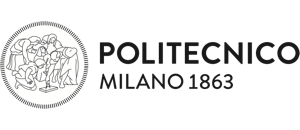Partners › Politecnico di Milano (PDM)

Politecnico di Milano is a leading technical university in Italy. Founded in 1863, it has five campuses, 5 Schools (2 of Engineering, 2 of Architecture, Industrial Design) and over 40.000 enrolled students. Research activity is carried out on a wide range of technical and scientific subjects in 12 Departments.
The Dipartimento di Elettronica, Informazione e Bioingegneria (DEIB - http://www.deib.polimi.it) aims at being a world-class scientific institution committed to forefront research, education, and technology transfer in computer science and engineering, electronics, systems and control, telecommunications, and bioengineering. The DEIB hosts 231 faculty members (full, associate, and assistant professors), 60 technical and administrative staff, 276 Ph.D. students, 152 short-term researchers, plus a large number of external staff supporting the teaching and research activities. Their vision is to promote the impact of Information and Communication Technology (ICT) on society at the national and international level, by pursuing excellent long-term and interdisciplinary research and by committing to innovation, technology transfer, and education. While it is not easy to predict the future use of information, the next decade will certainly see more dramatic changes, as ICT will find new ways of pervading people’s lives.
The group of System Architectures covers a quite large research area that includes parallel and distributed architectures as well as network servers down to intelligent embedded systems and pervasive sensor networks. Such a large spectrum of architectures, in continuous evolution, requires facing problems of modelling and design space exploration following flexible approaches that can be adapted to the optimization of different figures of merit, whose relevance changes depending on the application environment. Effective results have been obtained in these years by synergistically studying both the architectural characteristics of the single components of the systems, the application properties and the design methodologies oriented toward the concurrent development of hardware and software components. The System Architecture group gathers several different research themes, and previously existing labs (MicroLab and VPLab) have merged in the Novel, Emerging Computing System Technologies Laboratory (NECST Lab - http://necst.it/). The NECS Lab comprises a number of different research lines on advanced topics in computing systems, ranging from architectural characteristics, to hardware-software co-design methodologies, to security and dependability issues of complex system architectures (scaling from mobile devices to large virtualized data centers). Furthermore, the laboratory pursues its “historical” tradition of research in the definition of methodologies and techniques regarding testability, auto-diagnosis and fault tolerance both for hardware architectures and hardware-software systems.
Role: Development of reconfigurable tools platformWebsite: http://www.polimi.it/en/
Twitter: @polimi
© 2015-2026 EXTRA
The EXTRA project has received funding from the European Union Horizon 2020 Framework Programme (H2020-EU.1.2.2.) under grant agreement number 671653.

